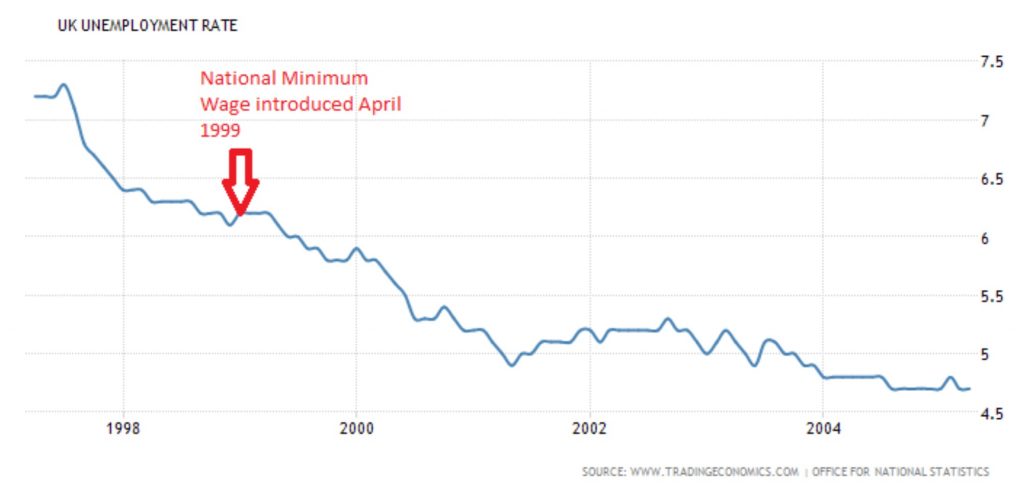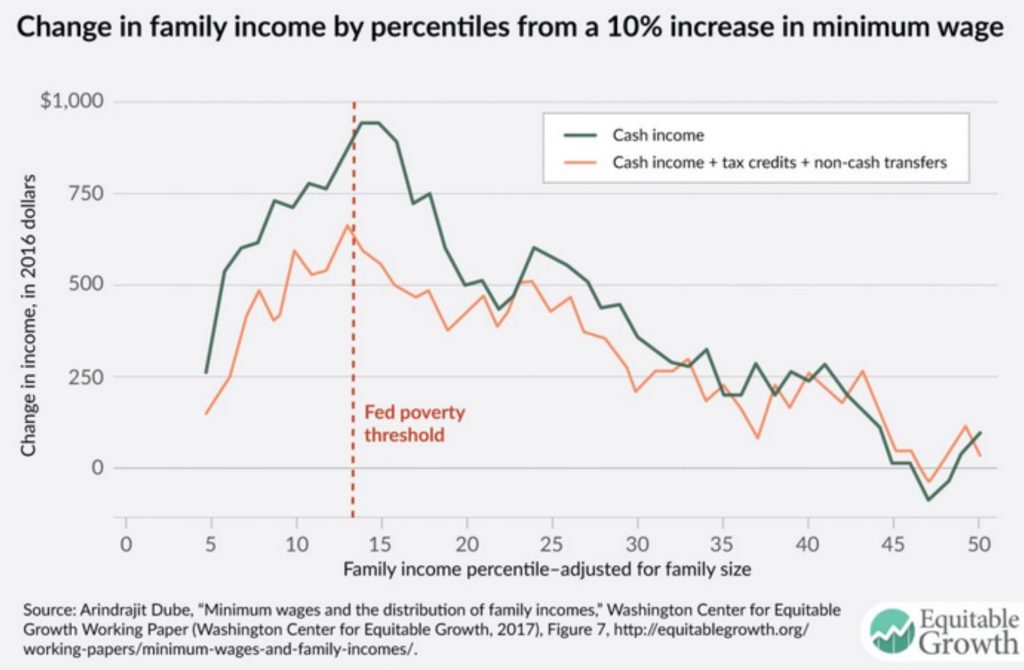Minimum wages: how high can they go?
04.05.17
“In wanting to tackle the scandal of poverty, it will do little or nothing to clear up that scandal, except shift responsibility from the state to the employer. Having sent those employers bust in some cases, it will have created unemployment. The unemployed—the very people whom Labour Members want to be liberated from the state—will then come back and make their demands on the state.”
This was the 1998 prediction of Shaun Woodward, a Conservative MP, and vigorous opponent of the then Labour government’s plans to introduce a national minimum wage. In the event, his warnings proved very far off the mark. After it was introduced in 1999, unemployment fell to historic lows – (see Chart), and in a curious symbol of the lost argument, Woodward defected to Labour. The Conservative party, ever the pragmatists, have since been converted to the cause. In 2015, George Osborne, the former Conservative Chancellor, pledged to raise the minimum wage to £9 per hour by 2020, and, in a signal of his party’s commitment to a once-derided policy, rebranded it the National Living Wage.

This, and similar experiences in other countries, have emboldened governments, of both left and right, who increasingly see the minimum wage as a low cost and powerful way of raising the incomes of the poor. As swelling budget deficits have caused governments to cut in-work benefits, the minimum wage has proved to be a vital bulwark against increased poverty. And by raising employment and the incomes of workers it can also raise tax revenue and reduce expenditure on out-of-work benefits.
Now in the US, where there is a federal minimum wage of $7.25 but thirty states have their own higher thresholds, the Democrats, led by Bernie Sanders, are introducing a bill to raise the federal minimum wage to $15 (£12.50) by 2024, while in the UK, the opposition Labour party are pledging to raise the minimum wage to £10 ($12) an hour by 2020, as part of their election campaign. So how high can minimum wages go?
Theoretically the economic impact of a minimum wage on employment is ambiguous. By raising wages above equilibrium, they increase the cost of hiring workers and thus reduce demand for labour, causing unemployment. But if employers have monopsony power (they have enough market power to influence the wage rate in their industry) then the impact of a minimum wage is to raise employment (up to a point). Furthermore, the efficiency wage theory suggests that a minimum wage could help raise employment by increasing productivity and lowering turnover. But, crucially, economic theory can’t tell us at what the balance of these effects is, or the wage level at which the negative effects start to outweigh the positive ones.
Michael Reich and Jesse Rothstein, of the University of Calfornia, Berkeley, have written a useful summary of the existing state of evidence on the likely effects of the proposed hike in the US minimum wage. According to them, the evidence suggests the impact on employment is generally small, but ambiguous in its impact (as theory would predict). They also emphasise the strong evidence that minimum wages reduce poverty, increase productivity, and improve health outcomes. Nonetheless, they highlight that a minimum wage of $15 is unknown territory, making predictions highly uncertain.
Arindajit Dube, of the University of Massachussetts, Amherst, is also positive about the prospects of the proposed hike. He finds that minimum wage increases significantly lower poverty rates. Other things being equal, his analysis suggests that a 10% increase in the minimum wage reduces poverty rates by 5% (see Chart). His model suggest that an increase in the federal rate to $12 an hour would be expected to lift nearly 7 million non-elderly people out of poverty. In an economy where over a quarter of workers earn poverty-level wages, that’s a compelling argument.

However, other research is raising alarm bells. Researchers at the Employment Policy Institute, a US think tank, cite a recent study by Harvard academics, Dara Lee Luca and Michael Luca, about the impact of minimum wage increases on the restaurant industry. That research found that increases in the minimum wage cause poorly rated restaurants to go out of business (but don’t affect the highly-rated ones). Theoretically this makes sense since restaurants don’t generally enjoy the monopsony power of other businesses. That suggests the proposed increases in the minimum wage could cause struggling small businesses to go under not just in the restaurant industry, but in other parts of the economy where competition is intense.
This issue of how prevalent monopsony power is, has been taken up by Ryan Bourne, a British economist based at US free-market think tank, Cato. He cites some new research by Terra McKinnish from the University of Colorado Boulder, which finds that increases in state minimum wages cause workers to commute to other states. Contrary to what one might expect, if Texas raises its minimum wage, more Texan workers start commuting to Oklahoma. According to Bourne, that is because the minimum wage increase is reducing the employment prospects available for workers, not increasing them.
Experience with minimum wages, so far, seems to bear out their ambiguous effects. Mostly, they seem to raise employment as much as they lower it. One possibility is that minimum wages cause job losses in competitive industries (where firms lack monopsony power), which are largely offset by the jobs they create in more monopolistic markets. If so, then the cost of minimum wages might not show up in the overall unemployment figures, but instead be contributing to a general shift of employment into sectors of the economy that enjoy monopoly power. The rise of monopoly power is trend that has been observed elsewhere, and could even partly explain the productivity slowdown. If so, then the opponents of minimum wages, like the erstwhile Shaun Woodward, were looking in the wrong place, all along.
- Overall:
- Demography:
- Knowledge:
- Innovation:
- Openness:
- Resilience: